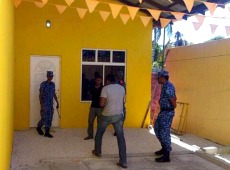Former Vice President of the Progressive Party of Maldives (PPM) Umar Naseer has filed for a Supreme Court ruling requesting the court declare how a person becomes a member of political party.
Speaking to local media outlet Sun Online, Naseer said that the procedure as to how a person becomes a member of political party were unclear as per the Political Parties Act. Therefore the case was filed at the court requesting it to make a clarification on the matter, added Naseer.
“It has to be cleared whether a person becomes a member of political party after he submits the form to the party office or whether the person is registered in the elections commission as a member of the said party. This is unclear. This is what I want to seek from Supreme Court,” he said.
The application for the ruling comes shortly after Civil Court dismissed his case challenging the legitimacy of the PPM’s presidential primary in which Naseer lost to Abdulla Yameen.
Naseer has since been removed from the party after accusing his rival of rigging the vote to secure his victory.
The Civil Court ruling stated that Umar Naseer has the opportunity to appeal the decision of the disciplinary committee with the party’s own appeal committee.
The court referred to Naseer’s accusations that the party’s disciplinary committee was under the influence of certain figures within the party, but said he was not able to prove these accusations.
The Civil Court said that unless this was proved otherwise the court had to consider that the disciplinary committee and appeal committee of the PPM were functioning as stated in the party’s charter.
In May, Naseer resubmitted the case at the Civil Court to try and invalidate the outcome of the Progressive Party of Maldives (PPM) primary vote.
The previous case seeking to invalidate the PPM primary was submitted by party member Rahma Moosa, who alleged that thousands of voters were not officially registered with the PPM at the time they cast votes on their preferred party candidate.
Rahma Moosa reportedly filed the case claiming that 8,915 people who were not officially registered as members of PPM had been allowed to vote in the primary. She contended that the move contravened the Political Party Act and compromised the rights of all general members of the party.
Meanwhile the elections commission has expressed concerned over alleged fraud involved in signing members to political parties ahead of the election.
On Tuesday, the Elections Commission sent a fraud case involving President Mohamed Waheed Hassan’s Gaumee Iththihaadh Party (GIP) after in found 11 membership forms had been filled out in the name of people who had died long before their signature appeared.
The Chair of the Commission Fuwad Thowfeeq said the commission decided to send the matter to police after it identified evidence of wrongdoing.
“If a person dies, or should their legal age come up to 18 years, they are automatically entered into our database. But in GIP’s case, they have deliberately filled out the forms on [members’] behalf. So certainly there is wrongdoing involved in it,” he said.
He said that the commission was currently probing into a case sent to it by the Anti Corruption Commission (ACC) regarding another fraud case concerning GIP’s party membership. The ACC claimed of 100 GIP members polled, 85 had no knowledge of ever joining the party.
